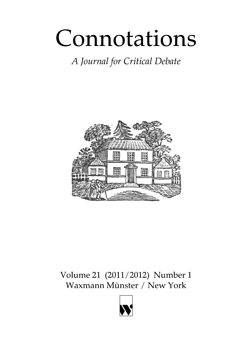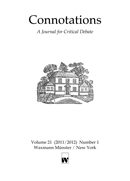Connotations Vol.21
(2011/12)
Articles in this issue
- Spenser's Monsters: A Response to Maik Goth and to John Watkins
Maurice Hunt, 21.1:1-7. - Card and Courtship Plays at Hampton Court Palace: The Rape of the Lock and the Origins of Game Theory. A Response to Sean R. Silver
Oliver R. Baker, 21.1:8-11. - Close Reading vs. Accretions of Dubious Scholarship: A Question of Competence. A Response to Kathryn Walls
Oliver R. Baker, 21.1:12-19. - Sympathy, Superstition, and Narrative Form; Or, Why is Silas Marner so Short? A Response to John Mazaheri
Anna Neill, 21.1:20-27. - Writings Backwards—Writing Forwards: A Response to Philipp Erchinger
Beatrix Hesse, 21.1:28-36. - The Woman in White and the Secrets of the Sensation Novel
Lynn Pykett, 21.1:37-45. - Thickening the Description: A Response to John R. Reed and Efraim Sicher1)
Leona Toker, 21.1:46-54. - Hopkins and Home2)
Adrian Grafe, 21.1:55-71. - Turning the Corner of Interpretation: A Response to Elena Anastasaki
Shalyn Claggett, 21.1:72-85. - Reconsidering Orton and the Critics: The Good and Faithful Servant
Yael Zarhy-Levo, 21.1:86-100. - Modernist Elements in Jane Hirshfield's Voice and Zen Meditation
Ling Chung, 21.1:101-24. - Modernist Elements in Jane Hirshfield's Voice and Zen Meditation: A Letter in Response to Ling Chung
Jane Hirshfield, 21.1:125-27. - The Ethics of Otherness in Ian McEwan's Saturday
Tammy Amiel-Houser, 21.1:128-57. - Poetic Economy: Ellipsis and Redundancy in Literature
Matthias Bauer, 21.2-3:159-64. - In Their Own Words: On Writing in Second Person
Joshua Parker, 21.2-3:165-76. - Leaps and Bounds: Hawthorne’s Strategies of Poetic Economy
Elena Anastasaki, 21.2-3:177-197. - "Mistah Kurtz—he dead" in Company: Redundancy and Ellipsis
William Harmon, 21.2-3:198-217. - Elegance and Poetic Economy in John Crowe Ransom and F. T. Prince
Rajeev S. Patke, 21.2-3:218-40. - Pinter’s Fractured Discourse in The Homecoming
Maurice Charney, 21.2-3:241-55. - Literary Allusions and Poetic Economy: Billy Collins’s "Albany" and William Wordsworth’s "I wandered lonely as a cloud
Judith Saunders, 21.2-3:256-71. - The Homosexual Temptation of the Son in Milton’s Paradise Regained: A Reply to John T. Shawcross and Claude J. Summers
David V. Urban, 21.2-3:272-77. - Re-reading Gulliver as Quixote: Toward a Theory a Quixotic Exceptionalism
Aaron R. Hanlon, 21.2-3:278-303. - On the Shore of Interpretation: The Theory and Reading of the Image in Imagism
Andrew Hay, 21.2-3:304-26. - "As I have heard Jeeves put it": A Response to Lawrence Dugan’s "Worcestershirewards: Wodehouse and the Baroque"
Laura Mooneyham White, 21.2-3:327-333. - The Family Reunion: Eliot, James, and the Buried Life: A Response to Edward Lobb
Miriam M. Chirico, 21.2-3:334-45. - Tragedy and Soap: Orton’s Good and Faithful Servant
Simon Shepherd, 21.2-3:346-62. - Telling the Difference: Clones, Doubles and What’s in Between3)
Amit Marcus, 21.2-3:363-96. - Untold and Unlived Lives in Kazuo Ishiguro’s Never Let Me Go: A Response to Burkhard Niederhoff
Rebecca Suter, 21.2-3:397-406.

